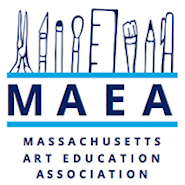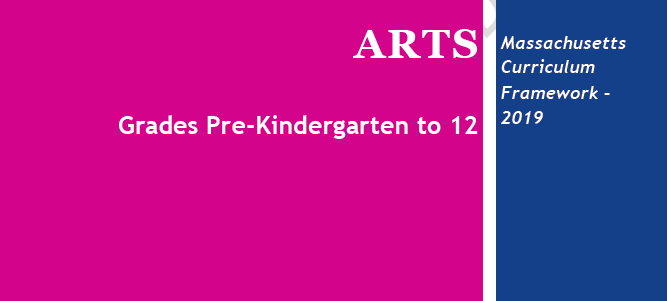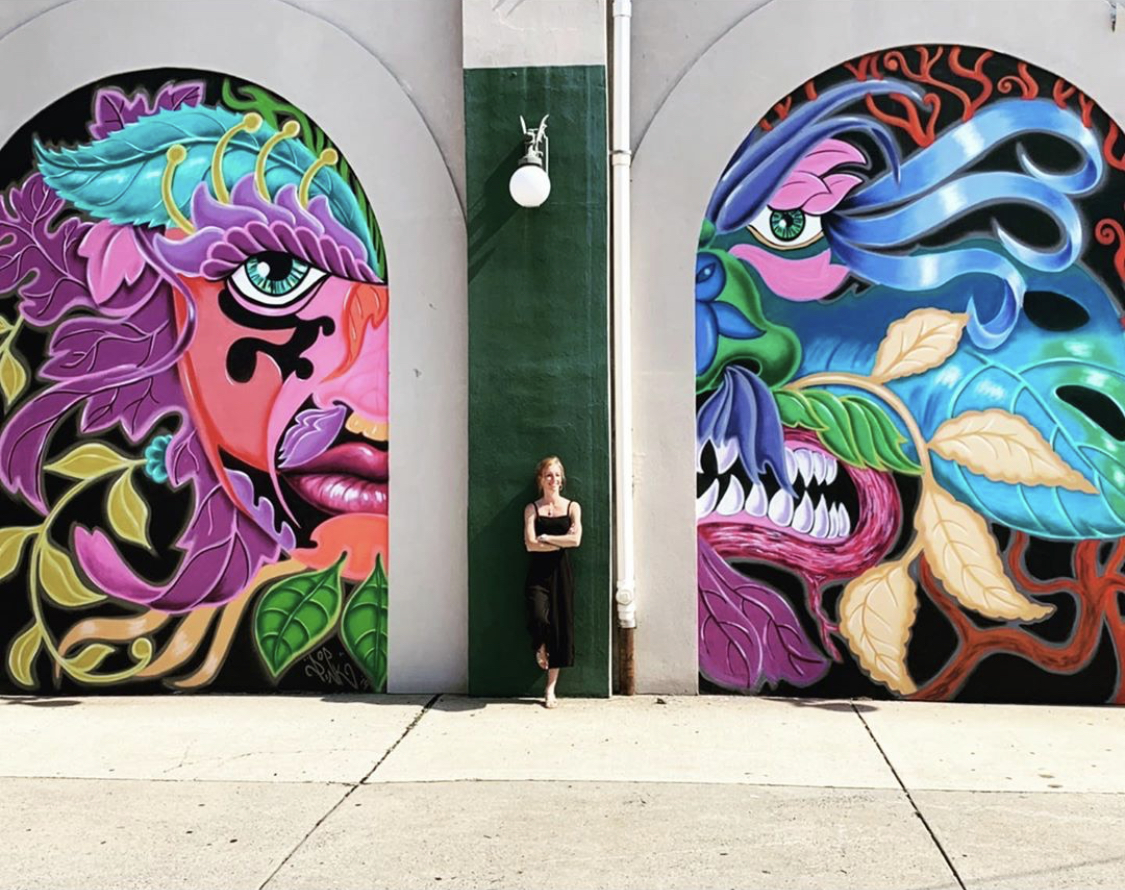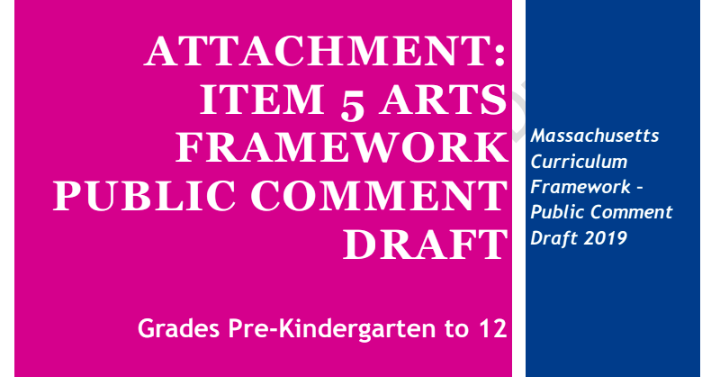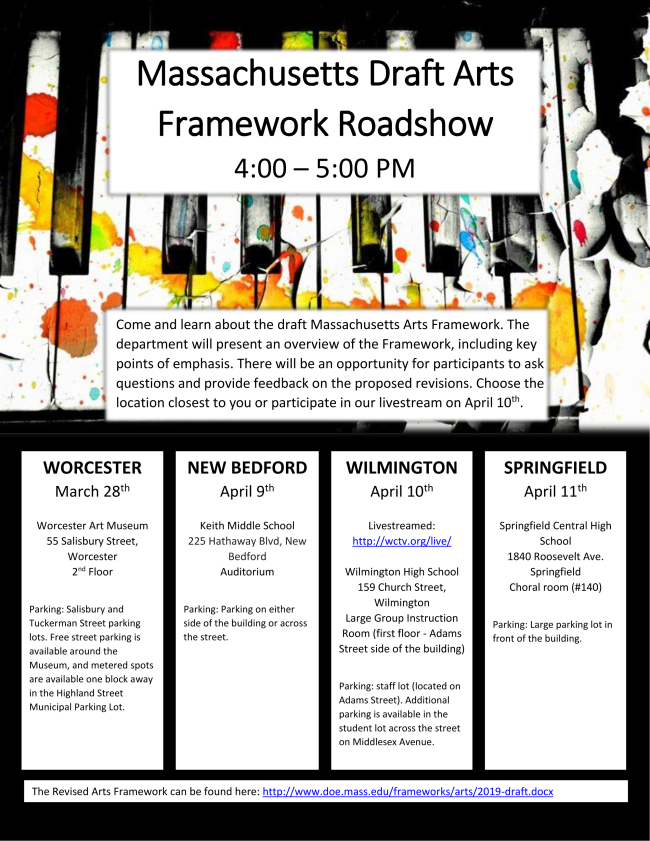Category: News
Arlene Black Mollo – Obituary
DESE Arts Ambassadors Teams Announced
We are excited to share that many of the Department of Elementary and Secondary Education Arts Education Ambassadors are Visual Arts Educators and MAEA Members! Congratulations to Visual Art Educators Louis Martinez, Peter Curran, Alice Gentili, Andrew Dexter, Timmary Leary, and Steve Aldeus. Congratulations are also in order to these dedicated Arts Educators who are also on the Ambassador Teams – Lisa Leach, Natalie Sowell, Christy Whittlesey, Linda Rae Krov, Natalie Bruno, Blake Siskavich, and Kim Taylor Knight.
Thank you for your dedication to this work!
Official 2019 Massachusetts Arts Curriculum Framework
The official Arts Curriculum Framework 2019 has been approved. The new framework has been posted to the Massachusetts Department of Elementary and Secondary Education.
Approved Arts Massachusetts Curriculum Framework
At the Massachusetts Board of Elementary and Secondary Education meeting on June 25, 2019, Associate Commissioner Ron Noble, lead writer of the revised framework Craig Waterman, and Arts Content Support Lead Dawn Benski presented a summary of the revised framework, which resulted in approval.
Currently a copy editor is finalizing the official document, which will be posted on the DOE website when complete. In the meantime, you can review the revised framework as submitted to the Board in late June for your planning purposes. MAEA has taken the proposed framework with tracked changes, and accepted them, creating this Word document. You will also find a PDF here.
If you have questions about the revised framework, please contact Dawn Benski, Arts Content Support Lead, Center for Instructional Support
Phone: 781-338-3235
First Person: A future for the arts in Worcester
MAEA President Laura Marotta shares some insights with Cara Berg Powers about the importance of the new Mass Arts Frameworks for Worcester and beyond. Read more at the Worcester Telegram and Gazette.
Support MAEA with AmazonSmile
Consider shopping through AmazonSmile the next time you place an order with Amazon to support the work of MAEA. For eligible purchases at AmazonSmile, the AmazonSmile Foundation will donate 0.5% of the purchase price to MAEA when you select us as your charitable organization. Learn more.
Arts Framework Review
Thank you to everyone who submitted feedback for the revised Arts Framework. Dawn Benski, who was recently hired by the Department of Elementary and Secondary Education in the role of Arts Content Lead, has been working to review every comment from the survey, which included feedback from over 300 participants!
The Arts Framework are set to be approved by the The Massachusetts Board of Elementary and Secondary Education at the June 25 board meeting.
In the meantime, if you missed the Arts Framework Roadshow, you can learn more about the structure of the Arts Framework by viewing the presentation and Q&A session recorded at Wilmington High on April 10, 2019.
Questions? Contact Dawn Benski at dawn.benski@doe.mass.edu.
Arts Frameworks Roadshow – Review of Draft 2019 Arts Curriculum Frameworks
Don’t miss out on your chance to learn about the draft of the Massachusetts Arts Framework. The department will present an overview of the Framework, including key points of emphasis. There will also be an opportunity for participants to ask questions and provide feedback on the proposed revisions. If you can’t make one of the three upcoming events in person, attend the livestream on April 10.
On February 12, 2019 the Massachusetts Board of Elementary and Secondary Education approved the release of the draft 2019 Arts Curriculum Framework for public comment. It has been almost 20 years since the state’s arts standards were last revised in 1999, and the new draft makes several important changes. Specifically, it:
- Recognizes media arts as a discipline alongside dance, music, theatre, and visual arts;
- Utilizes a new organizational structure that
- Is consistent across disciplines, supporting integration,
- Integrates content from the 1999 framework’s Connections strand into the discipline-specific standards,
- Includes standards for artistic practice aligned to the National Core Arts Standards;Provides more detailed learning expectations, with two-year instead of four-year grade spans.
- Provides more detailed learning expectations, with two-year instead of four-year grade spans.
- Adds guiding principles focused on engaging students and ensuring exposure to wider range of cultures and styles.
The Department wants to hear from you! Please review the draft and provide comments using this survey.
Email Craig Waterman with any questions.
News Release from Arts|Learning: Major Advances for Massachusetts Arts Education!
State education leaders praised for adopting measures to increase arts access and visibility
BOSTON, March 29, 2017-The Arts for All Coalition today praised the state’s Board of Elementary and Secondary Education (DESE) for adopting new guidelines that will prioritize arts education for students across the Commonwealth. The new guidelines were written in response to a new federal law, the Every Student Succeeds Act (ESSA), which emphasizes every student’s access to a well-rounded education, including the arts.
Under the new DESE plan, every school district will report arts education access and participation data on their school and district “report cards.” This will give transparency to parents, students, and communities as to the status of arts education in every community in Massachusetts. State education leaders have also committed to revising the Arts Curriculum Framework, which was last amended in 1999. Curriculum frameworks are the guides districts and schools use to develop local curricula and to determine a quality education in each subject area.
“Business leaders consistently report that new hires are lacking in creativity, innovation, and other 21st-century skills that the arts help to develop, so we’re proud to see Massachusetts leading on this front,” said Arts|Learning Executive Director, Jonathan Rappaport. “These new guidelines will ensure that arts education is something that is necessary for every district and school in the state.”
Passed by Congress in late 2015 with overwhelming bipartisan support, ESSA includes instruction in the arts in the federal definition of a “well-rounded education.” In preparation for implementation of ESSA for the 2017-18 academic year, each state must revise its accountability plan for school districts to reflect this new definition. In addition to test scores, accountability standards must include other indicators of school quality, such as measures of participation in arts instruction.
DESE officials spent 10 months researching district needs for the new guidelines and meeting with key stakeholders. The Arts for All Coalition, which consists of MASSCreative, Arts|Learning, Edvestors, Boston Public Schools, the Massachusetts Cultural Council, Young Audiences of Massachusetts, MassINC, and Project LEARN-Lowell, engaged in the process providing research and public input on the importance of arts education in a well-rounded education. One of the state’s educational challenges identified during this process was that six percent of elementary students (over 35,000 students!) and 50 percent of high school students do not have the opportunity to engage in quality arts instruction.
